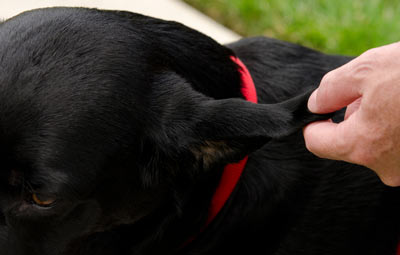Ear Hematomas in Dogs

An ear or aural hematoma in a dog occurs when blood gathers between the skin and cartilage of the ear flap. The result is an ear flap that appears to be ballooning or bulging.
What Causes Canine Aural Hematoma?
Ear hematomas in dogs are usually caused when a dog shakes his head violently, resulting in the ear flaps banging against his head or into nearby firm objects.
A dog that scratches at his ear flap or experiences some other trauma to it can also develop an aural hematoma.
Most often, an underlying ear problem causes itchiness, pain, or discomfort to the dog, which results in him shaking his head hard or scratching at his ear. The most common causes of ear discomfort and resulting hematomas are:
- Otitis, which is inflammation and infection of the ear canal.
- Ear mites, which cause intense itchiness and pain in a dog's ears.
- Allergies, especially ones to food, often cause ear itchiness in dogs.
- Foreign material like a foxtail making its way into the ear canal often causes pain.
Treatment of Ear Hematomas in Dogs
If your dog's ear flap appears swollen, visit the veterinarian right away. Sometimes, small hematomas will heal on their own if the underlying condition is properly diagnosed and managed.
However, an ear hematoma that is left to heal on its own often results in scarred, crinkled tissue on the ear flap. Here are some other ways aural hematomas are sometimes treated in dogs:
- The hematoma can be drained with a needle. This relieves some of the pain the dog might be feeling from the taut tissue. However, the ear flap will almost always refill with blood again, so this is virtually never a long-term solution.
- Veterinarians sometimes drain canine ear hematomas and then inject them with long-acting steroids to control inflammation and calm things down.
An Elizabethan collar will probably be necessary to keep your dog from flapping his ears or scratching at them during whatever type of treatment is used.
- Surgery is usually required to repair ear hematomas. The ear flap is opened up, and the blood and any clots or other tissue are removed. The flap is then tacked down with sutures to eliminate space between the skin and cartilage in the ear flap where blood is gathering. The dog wears an E-collar, and the cause of the ear hematoma is simultaneously treated. The sutures are usually left in for around six weeks.
Regardless of the treatment that is used on the actual ear hematoma, the underlying cause must be diagnosed and treated aggressively for the hematoma to heal and to decrease the odds of it returning.
Prevention of Ear Hematomas in Dogs
Preventing ear hematomas means getting your dog in to the veterinarian anytime you notice a potential problem with the ears. Here are some of the signs of an ear problem that might lead to a hematoma:
- Shaking of the head.
- Scratching the ears with back claws
- Redness or other debris in the ear canal.
- An odor coming from the ears.
- Scabs or hair loss on or around the ears.
You May Also Like These Articles:
Otitis Externa: Ear Infections in Dogs
Good Small Breed Dogs for First Time Dog Owners: Slideshow
Use Your Voice and Body Language to Make Your Dog Happy
Which Dog Breeds Shed the Least?
Disclaimer: This website is not intended to replace professional consultation, diagnosis, or treatment by a licensed veterinarian. If you require any veterinary related advice, contact your veterinarian promptly. Information at DogHealth.com is exclusively of a general reference nature. Do not disregard veterinary advice or delay treatment as a result of accessing information at this site. Just Answer is an external service not affiliated with DogHealth.com.


